What to expect at Cape Town WUDC 2019?
Five days ago the WUDC council announced that Cape Town won the vote to be WUDC host for 2019. We took the opportunity to ask the conveners about everything you might want to know. Have fun!
Who are you and what’s your role at Cape Town WUDC?
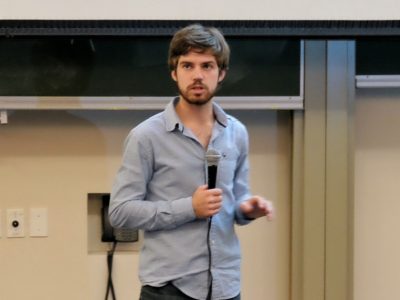
Matthew Barry: External relations, debating and operations – © private
Matthew Barry: I’m one of the two co-conveners and I’m going to be hitting up the logistical side of things. I’m communicating with the tab team and doing the more debate-related stuff. That’s what I’m handling. I study mechanical engineering and have been debating since 2008. I don’t think I’m a good debater though, which might be why I’m organizing it.
Marcus Gawronsky: He’s also very honest.
Matthew: I like drinking wine as well. I think my official title is external relations, debating and operations.
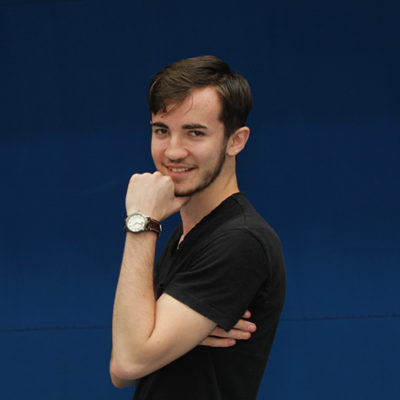
Marcus Gawronsky: Internal relations, risk, business continuity and finance – © private
Marcus: I’m managing internal relations, risk, business continuity and finance, meaning for example coordination with our university. I currently study towards a bachelor of business science, majoring in finance and accounting, also at the University of Cape Town. I’m also at the university as a student representative in the student representative council, and I’m involved in some of the university’s committees related to finance.
Matthew: All the senior members of the orgcomm are at UCT.
Marcus: But our orgcomm draws in people from all around.
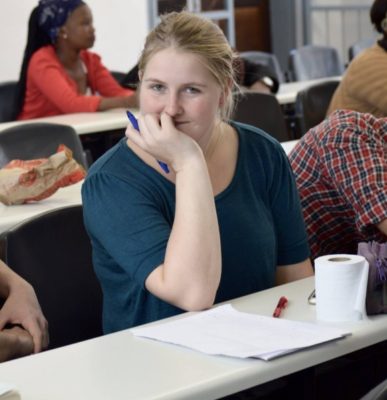
Emma Tiffin: Tournament director – © private
Emma Tiffin: So, I’ve just graduated with a bachelor of science with chemistry and biochemistry. And I’ve started post-grad school at UCT this year. I am the tournament director, which will mean connecting the convenors to the debating community. This means I have to look that everything runs well with the participants, volunteers, etc.
Marcus: If we ran a circus, Matt and I would be the producers and she would be the ringleader running the show.
Emma: Worlds is a circus! It comes to people management a lot.
Marcus: Generally spoken: Matthew deals with external relations, I deal with internal relations and Emma deals with the relations with participants themselves.
What does it mean to be a debater in Cape Town?
Marcus: I grew up in Cape Town and so I’ve been debating here for about 9 years. We are very blessed to have a very diverse audience, from our very privileged private schools down to the poorest state schools. Around the country I think debating in South Africa is doing very well and I think a lot of our success, also in World Schools Debating, goes back to the university. We have a tournament about every month and lots of people not just from South Africa come, also from Botswana, Zimbabwe, etc. So far it has probably been hard for African debaters to break into the European debate region, due to costs, so something nice about our debating circuit is that when you look at the motions we debate we are looking at local issues, but they fit quite well with international tournaments, for example motions about identity issues, inequality in South Africa…
Emma: Politics, mainly, that’s always important here. But something to know about Cape Town is that it’s far away from most other debating societies, so driving for eleven hours to a tournament is quite usual for us. I think that’s something quite unique to our Cape Town situation, which leads to our societies in the Western Cape having a lot of cooperation. We have strong friendships with the other unions and we are all excited about hosting WUDC.
How did you end up organizing a WUDC?
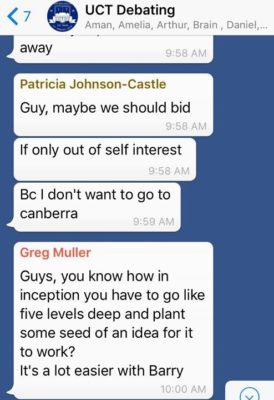
The chat where it all started. – © private
Matthew: Someone made a joke on a WhatsApp group and we ran with it.
Marcus: That’s literally what happened.
Emma: When there was no bid for 2018, that was when you guys started thinking about it.
Matthew: Well, we just lost the bid for Southern African Nationals, so we talked about it. I mentioned how I had just been asked to join the bid we had lost to and someone asked „Matthew, what have you NOT been organizing?“ And I answered „Worlds“ and so it started. At the start we talked a lot, hesitated a little, went on, but when we found out Mexico was bidding and there was three months left we decided not to run against them, since both regions have rather underdeveloped debating circuits. It was probably only around May 2016 that we realized, as a union, we had the capacity and could actually do it.
Marcus: We got endorsements from our University, from the city, and others. So we got really excited and decided to bring it to the international community. But when Matt first came to me, I called him crazy, but he is a visionary and made some phone calls and things started to become real.
What do you think were the main reasons for your bid making the vote?
Marcus: Cape Town is a beautiful city, we are blessed with beaches, mountains, African sunrises.
Matthew: But Bali also has these things. I think we are very lucky to have the CA-team that we have. We were very lucky to have Duncan Crowe as one of our advisors and he just won the bid for the EUDC and also helped Mexico out, so he helped a lot. Basically we did a lot of getting in touch with people and trying to make sure that noone gets left behind. And Yakka, I think.
Emma: I also think that the community realized that it was a bid that needed to happen, we have tried it a lot and I think people realized that regional diversity is important. I think many people put their regional interests aside to make that possible.
Matthew: Well linked to regional diversity as the Israeli visa issue. It hurt Bali, but I don’t think that’s something we are proud of claiming, though. It’s sort of an unfair advantage we had, and we also have many people who will struggle to get here, who could have gotten to Bali, so it’s definitely a front we have to work on.
The things most people consider crucial for a tournament are mainly linked to basic organization. In The Hague people praised the tournament because it ran well on time. In Thessaloniki and The Hague people complained about the food – either for it being 3 hours late or because of strange ideas about the popularity of Dutch bread. Where do you see your bid’s strengths and weaknesses in terms of running things smoothly?
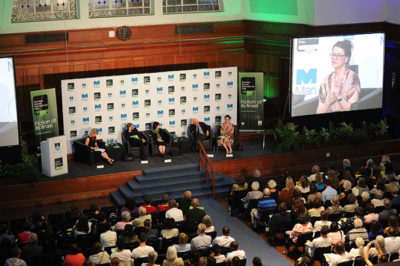
Jameson Hall is going to be the announcement hall for the tournament. – © UCT
Emma: I think one thing that can go wrong with a bid is logistics and underestimating how long it takes to get people to another location. But one of our strengths is that we are 15 minute walking distance between the accommodation and the venues. That will make our lives and participant’s lives much easier – you won’t have to get up early or wait long because of transfers.
Matthew: The GA is right in the middle of campus and venues all along one road, it will be really simple to navigate and find. On the other hand, UCT has just changed to internal catering, and we haven’t worked with the new team yet. Still, we expect to serve you three hot meals a day. When I was in residence at dinner we got two hot meat options and one vegetarian, as well as a desert. Breakfasts always came with a large amount of cold options to choose from as well as two hot options like french toast or bacon and eggs. We also have two huge dining rooms as well as some temporary locations on Upper Campus, where the debating venues are, which we hopefully can use to serve a hot lunch from without having to come back to the residences.
Marcus: In our supermarkets, we have „Melk“ as well, since Afrikaans is some kind of mix of Dutch, English, French, and German. But on a more serious note: We also have lots of special needs food prepared.
Matthew: At some point Marcus instructed me on the proper procedure to produce kosher Yakka.
Marcus: My cousin is one of the campus rabbis, he said he would bless the Yakka for us in exchange for a few cups.
Matthew: We also will make Lakka, which is a non-alcoholic version of Yakka. We’ll provide it for all those who visit us and don’t want alcohol.
Marcus: Also since we have a high muslim population, all of Cape Town is quite prepared for that as well.
Matthew: On the running smoothly part: I know that our tab team has many ideas about how to take what they did really well at Dutch WUDC and to keep evolving ballot-, running-, draw- and messaging systems even further. We’ll be spending the next two years trialing various ideas at tournaments in all four circuits represented on the tab team, to try and identify the most efficient systems possible.
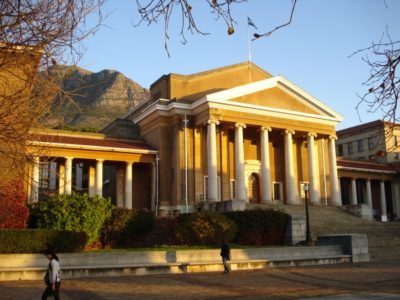
Jameson Hall from outside, located at the University of Cape Town campus – © UCT
Marcus: And one thing we also are proud of is the very experienced tab team.
Matthew: We haven’t decided which software we’ll use yet. Currently, Tabbie 2 seems like a good system but two years is a long time in software so we will see. I am a little concerned about it in the African situation with e-ballots, though, since a lot of African debaters don’t have access to eduroam or a smartphone that can handle the ballots. It’s not about Wi-Fi in general, the Wi-Fi is great. We’ll test it at Cape Town Open, and if need be we have a horde of runners. Most of the delegates can use eduroam just fine though.
Emma: We have never done such a large tournament before, though, and you can’t really practice it. But we will be in Mexico and hopefully at the EUDC, but we also appreciate input from the international community.
Marcus: It’s an international project after all, so we think that WUDC should improve every year, keeping the good things and improving further. In South Africa we have a strong organisational backbone and we think we have many people who are really good at execution.
Matthew: Still, there is no practice. So if there would be any point of failure, I imagine it being something like delays in the schedule that demand flexibility that someone like our catering team may not be able to accommodate, but we try to give everyone of our team members ideas about what a debate tournament like Worlds can be like, so they should be well prepared.
Money obviously is important. How well is your bid situated in terms of sponsoring? Did you already achieve certain contracts you can tell us about? Are there others that might be secured soon?
Matthew: There’s nothing we can tell you about now because we haven’t signed any yet, but we had some very promising developments in the last three days. We have one sponsor who has expressed interest and has sponsored Worlds before, and there are a couple of South African companies that might be interested, but nothing we can tell you in detail so far.
Emma: Since a lot of our fixed costs are signed with the university already, though, there shouldn’t be any reg fee increase, it can only change into one direction, which is down. Our finance is also audited by the university, which is good.
Matthew: At other tournaments, companies were skeptical towards giving money, to basically „a bunch of students“, and the university creates trust.
Marcus: It’s something you can’t just have as a „bunch of students.“
Matthew: Having the University’s logo on our letters definitely helped a lot.
Where is the reg fee right now and where do you think it will realistically be when the registration starts? Which spending aspects in the budget do you prioritize? If you’d ever need more money, what would you do?
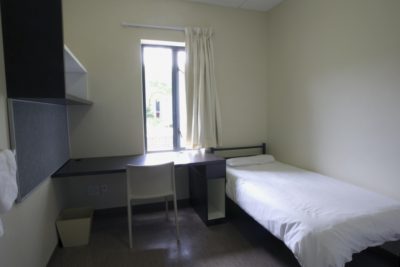
For accomodation there are single rooms at the campus. – © UCT
Matthew: It’s not something we have discussed a lot, since it won’t come to that, but probably the easiest thing to cut would be the social’s budgets. Live entertainment is nice, but an iTunes playlist can do as well. The IA budget is something I wouldn’t touch.
Marcus: But basically we have calculated it in a way that reduces risks to a minimum, so it’s not likely anything changes. Many cases where people increased the reg fee later did that, because they calculated with quotes and promises, we did it with fixed prices.
Matthew: Another aspect where we could save money though, would be putting people into double rooms, which are cheaper at UCT, but obviously single rooms were part of our bid. Looking at my data, that would save around 52000€. Those two areas are something were we could save without losing much tournament quality, but like we said this is quite an unlikely scenario.
Assuming there will be a certain amount of IA funding: What criteria would you prioritize in distributing the budget? Possible aspects we thought about were regional diversity, and – coming with that – language diversity as well as gender distribution, but also level of experience and the cost to get them to South Africa. Do you already have an approach?
Matthew: I don’t think that’s our question to answer, you would have to ask the CAs about that. We separate those things strictly. Our budget should be sufficient to get all our IAs funded, though.
What makes a good social for you?
Matthew: It has to be something that everyone can participate in. Having a great event can be possible for everyone whether or not people have alcohol: When you provide a good programme, everyone has fun. If we can have cheap beer on top, that’s great, but our main goal is to host something everyone finds enjoyable. Social means interacting with people. We think socials must be in a way, that people want to come and participate.
What ideas do you have for socials at the tournament? Are there any socials or locations that you already secured?
Matthew: At the moment three of the socials where we provide everything are being held on the campus, but we are trying to move the opening and closing ceremony off campus. The breaknight, however, will stay on campus, and you won’t have to drive anywhere.
Emma: Currently the Yakka party and breaknight are the same social, so it should be great.
Matthew: We’d also like to have a campus pool party at some point, and for breaknight we are also having a braai (barbecue) on the rugby fields.
Emma: And since it’s private property we’ll never have neighbours complaining.
Matthew: And since the University has a liquor license, all is totally legal as well.
Are there already plans for cultural or fun excursions during the free days?
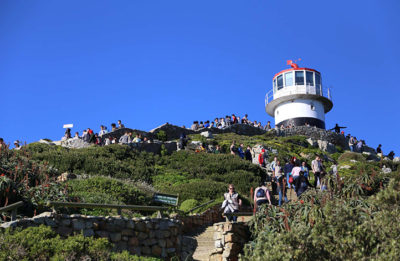
The area around Cape Town is well-known for its tourist attractions. – © Cape Town
Matthew: We have some arranged tours and stuff like that, but to book them in advance is somewhat tricky. We are still kind of figuring out how to know people’s preferred tours in advance.
Emma: Cape Town has a lot of tourism, that’s why it’s always hard to get tours without knowing the number of people wanting a certain tour before. But for the programme we are cooperating with our local tourism bodies and hope to offer a lot. And because most people fly in via Johannesburg, you could also go for a day to there while in transit.
Matthew: We have quotes for a Cape Point tour, a Winelands tour, and a Table Mountain and City tour. If we can provide enough transportation, people can do their own tours anyway. There could also be a pool party on the free day. We also can offer people to extend their stay in the accommodation longer, which is way cheaper than the Cape Town hotels.
Emma: You’d still have to plan your trips in advance, it’s really hard to get into tours spontaneously.
Matthew: We were also asked not to make January 1st the free day, because it’s a public holiday. Maybe if we were pushed we’ll move it to January 2nd.
What do you think will be the thing most people remember after the tournament?

Well remembered from The Hague, also available in Cape Town: Melk. – © private
Matthew: The stairs. Lots of stairs. Don’t worry though, everything is easily accessible with a wheelchair as well, though.
Emma: I’d like to say Yakka parties, maybe the good weather, I think some sunshine will do everyone good, but it’s hard to do these presumptions.
People have asked us – and I know this came up at the bid votes already – whether many African debaters would be able to attend the tournament and whether there is any special concept for improving their accessibility?
Emma: Well, first of all an advantage is the nature of travel cost. It’s much easier to convince your university to fund you, when it’s not a long-distance flight and not so much for a visa. We think universities will be more incentivised to fund you there. It’s also closer to what they know, because many universities don’t have a lot of experience in international debating. A lot of corporate South African companies also have no idea about the advantages of debating and we hope that through engaging with them as sponsors this might grow. Also, our lovely adjudication core have agreed to come one or two weeks earlier to do workshops and interaction that we usually don’t see in our region. It will be something we don’t see that often, and people will have an incredible experience here, like we did in The Hague. Apart from that, we also plan on getting lots of volunteers from schools and students who normally couldn’t afford to attend.
Marcus: When WSDC was hosted in Cape Town in 2012, what they did was ship the WSDC teams out to local schools and it had an incredible effect on our schools. I think we can do something similar, especially given the number of cooperations we have. We want to bring in young debaters, making that experience.
Matthew: I think a lot of the problem with African teams not attending Worlds isn’t a lack interest. There is a lot of interest. It’s funding. And even if a university gives them funding, the funding comes in too late and they don’t have the money to first pay it themselves. For example, this year when UCT was planning for Dutch Worlds – it only covers the reg fees – it didn’t come from the University in time, so members put forth the deposit. But we are rather privileged and there are many other societies that don’t have that, and when the deadline comes they can’t pay. So what we are going to look to do the next year is firstly some kind of education campaign: What awaits you at registration, when do you have to expect what stuff, but also to educate us about the needs of other Africans, how their funding systems work etc. And if we can give them that information in advance to start the paperwork at their universities in time… well, we plan to open registration as early as possible and make the first deposit payment due after a longer period than usual, this might help them.
Emma: We can’t give them credit, though.
Matthew: That’s true. But seeing that most people have theoretically access to funding they practically can’t get, we’ll try to solve that.
Is there anything the international debate community can do, to make Cape Town worlds more accessible for the African continent?
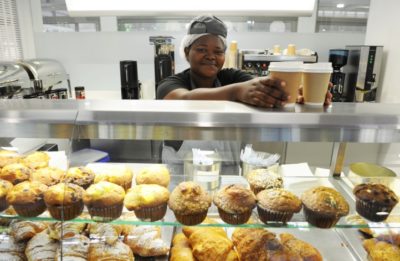
The University of Cape Town has it’s own catering. – © UCT
Emma: Well, first of all international independent adjudicators should be honest about how much money they really require. If people tell us truly how much they need, we could perhaps invite more African IAs, and there are a lot of competent adjudicators in Africa.
Matthew: We have the capacity to increase the team cap and if we have enough money surplus, we could also think about funding African teams. Also, on a more general scale and for future Worlds, if more Worlds bids would start taking Africa more seriously, taking more African CAs, that would change a lot and they would discover a great debating circuit.
Emma: It would also help a lot, if we had external funding for our top teams to get to Worlds. For example, our national and regional top teams both couldn’t go to The Hague because they couldn’t afford it, which is a shame. Another aspect is that our circuit kind of lacks confidence, for example with speaker points. We give the same speech lower points here than at worlds. It would probably also help, if Africans could show themselves how good they are.
Matthew: Africa is also not the only region in the world that suffers from underfunded universities. If people who somehow managed to get along with that, we’d really love to have an exchange of strategies for fundraising etc. There must be something, we do wrong, with corporations or universities.
The interview was conducted by Lennart Lokstein.
lok./jm.





